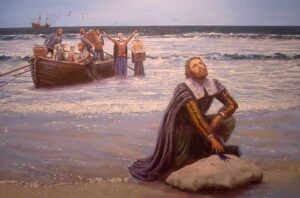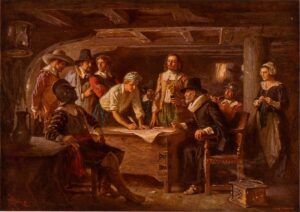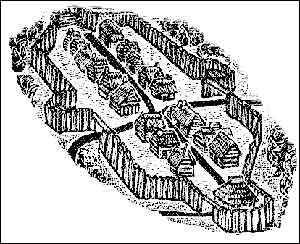 The Pilgrims were a praying people. It was out of a prayerful heart that their story was born. It was in prayer that they confirmed their salvation and relationship to Jesus Christ to “reform their lives.” It was also in prayer that they consecrated themselves to one another “by a covenant of the Lord.” They also made their corporate decisions (including financial ones) consented to by the congregation a matter of humiliation, prayer, and fasting. Once arriving in the new world, their first act was to “fall upon their knees and bless the God of Heaven.”
The Pilgrims were a praying people. It was out of a prayerful heart that their story was born. It was in prayer that they confirmed their salvation and relationship to Jesus Christ to “reform their lives.” It was also in prayer that they consecrated themselves to one another “by a covenant of the Lord.” They also made their corporate decisions (including financial ones) consented to by the congregation a matter of humiliation, prayer, and fasting. Once arriving in the new world, their first act was to “fall upon their knees and bless the God of Heaven.”
 In setting up their civil government with the Mayflower Compact, they would have followed the advice of their Pastor in his farewell letter to “let their wisdom and godliness appear, not only in choosing such persons as do entirely love and will promote the common good, but also in yielding unto them all due honor and obedience in their lawful administrations, not beholding in them the ordinariness of their persons, but God’s ordinance for your good.” This cannot be done without a prayerful attitude of humility before the Lord to make sure our choice (or vote) is actually mirroring His choice!
In setting up their civil government with the Mayflower Compact, they would have followed the advice of their Pastor in his farewell letter to “let their wisdom and godliness appear, not only in choosing such persons as do entirely love and will promote the common good, but also in yielding unto them all due honor and obedience in their lawful administrations, not beholding in them the ordinariness of their persons, but God’s ordinance for your good.” This cannot be done without a prayerful attitude of humility before the Lord to make sure our choice (or vote) is actually mirroring His choice!
 After setting up a more godly economic system featuring private property, personal profit incentive, voluntary charity, respect for differences, and, above all, a self-regulation of one’s sinful tendencies in order to, out of love, serve and bless one another, it seemed that God brought calamity upon them! Think of it, now that they had private gardens, individual profit, and three times the amount of land prepared for a greater harvest in harmony with God’s will; wouldn’t they be blessed for their obedience in changing from this “common course and condition” which they knew was against His will? Bradford writes:
After setting up a more godly economic system featuring private property, personal profit incentive, voluntary charity, respect for differences, and, above all, a self-regulation of one’s sinful tendencies in order to, out of love, serve and bless one another, it seemed that God brought calamity upon them! Think of it, now that they had private gardens, individual profit, and three times the amount of land prepared for a greater harvest in harmony with God’s will; wouldn’t they be blessed for their obedience in changing from this “common course and condition” which they knew was against His will? Bradford writes:
“But it pleased God, for our further chastisement, to send a great drought, insomuch as in six weeks after the latter setting there scarce fell any rain; so that the stalk of that was first set began to send forth the ear, before it came to half growth, and that which was later not like to yield any at all, both blade and stalk hanging the head, and changing the color in such manner, as we judged it utterly dead. Our beans also ran not up according to their wonted manner, but stood at a stay, many being parched away, as though they had been scorched before the fire. Now were our hopes overthrown, and we discouraged, our joy being turned into mourning.”
Writing in chapter 14 of his narrative on the year 1623, William Bradford clearly articulates the necessary attitude toward prayer as an essential ingredient in successfully experiencing economic productivity. As I wrote in 2012:
“He [Bradford] states the Pilgrims had to “rest on God’s providence… [the] need to pray that God would give them their daily bread….” In other words, even though they had a better economic system, without prayer it would ultimately fail. This, in essence, was an application of Pilgrim theology at work curbing the natural and corrupt pride of man. Why did he make prayer a key ingredient?”
 After Bradford rehearses the challenge of the “great drought which continued from the third week in May, till about the middle of July, without any rain and with great heat for the most part,” he then writes, “Upon which they set apart a solemn day of humiliation, to seek the Lord by humble and fervent prayer, in this great distress.” This prayer and fast (humiliation) day occurred on a Wednesday. The Pilgrims, and future congregations of Puritans as well, made special days of prayer and humiliation whenever crises of various kinds took place, whether moral or natural (such as a drought, in this case.)
After Bradford rehearses the challenge of the “great drought which continued from the third week in May, till about the middle of July, without any rain and with great heat for the most part,” he then writes, “Upon which they set apart a solemn day of humiliation, to seek the Lord by humble and fervent prayer, in this great distress.” This prayer and fast (humiliation) day occurred on a Wednesday. The Pilgrims, and future congregations of Puritans as well, made special days of prayer and humiliation whenever crises of various kinds took place, whether moral or natural (such as a drought, in this case.)
It may surprise today’s Christian to learn that this prayer meeting was not to ask God for rain. Remember, Bradford wrote, “It pleased God, for our further chastisement, to send a great drought.” This is strange language for those unfamiliar with how the Pilgrim congregation was taught by their pastor, John Robinson. Robinson exhorted them in this way: “In our public prayers, and praises of God, we do give testimony of his providence in governing the world, and all our affairs; and that he is present with his Church, and hears their requests; for the convincing of atheists, and epicures; and confirmation of others in believing undoubtedly his care over his people and servants.” Ultimately, they understood that everything that happens in our lives, including those things that are difficult, are allowed by God, often for reasons we may not know about in this life.
 Bradford relates the results of this day of humiliation and prayer: “He [God] was pleased to give them a gracious and speedy answer, both to their own and the Indians’ admiration that lived amongst them. For all the morning, and greatest part of the day, it was clear weather and very hot, and not a cloud or any sign of rain to be seen; yet toward evening it began to overcast, and shortly after to rain with such sweet and gentle shower as gave them cause of rejoicing and blessing God. It came without either wind or thunder or any violence, and by degrees in that abundance as that the earth was thoroughly wet and soaked and therewith. Which did so apparently revive and quicken the decayed corn and other fruits, as was wonderful to see, and made the Indians astonished to behold.”
Bradford relates the results of this day of humiliation and prayer: “He [God] was pleased to give them a gracious and speedy answer, both to their own and the Indians’ admiration that lived amongst them. For all the morning, and greatest part of the day, it was clear weather and very hot, and not a cloud or any sign of rain to be seen; yet toward evening it began to overcast, and shortly after to rain with such sweet and gentle shower as gave them cause of rejoicing and blessing God. It came without either wind or thunder or any violence, and by degrees in that abundance as that the earth was thoroughly wet and soaked and therewith. Which did so apparently revive and quicken the decayed corn and other fruits, as was wonderful to see, and made the Indians astonished to behold.”
One blessing that may result from prayer with humiliation (true humility before God) is that we may see in our lifetime an eternal good coming from our difficulty. Such was the case in this instance. The conversion of Hobbamock, the Native who would become the Pilgrim interpreter after the death of Squanto in 1622, occurred after this day of prayer.
So what lessons can we learn from the Pilgrims? The degree to which true prayer, with humility toward God, is practiced in our lives and in the Church, will be the degree to which we may witness an increase in the conversion of others. Conversely, the degree to which God’s sovereignty is no longer in the hearts and minds of the Church (and consequently the nation) is the degree to which even a good government and economy will not long succeed. May God help us return to a conscious turning to the Lord in the midst of every crisis of our culture today.







